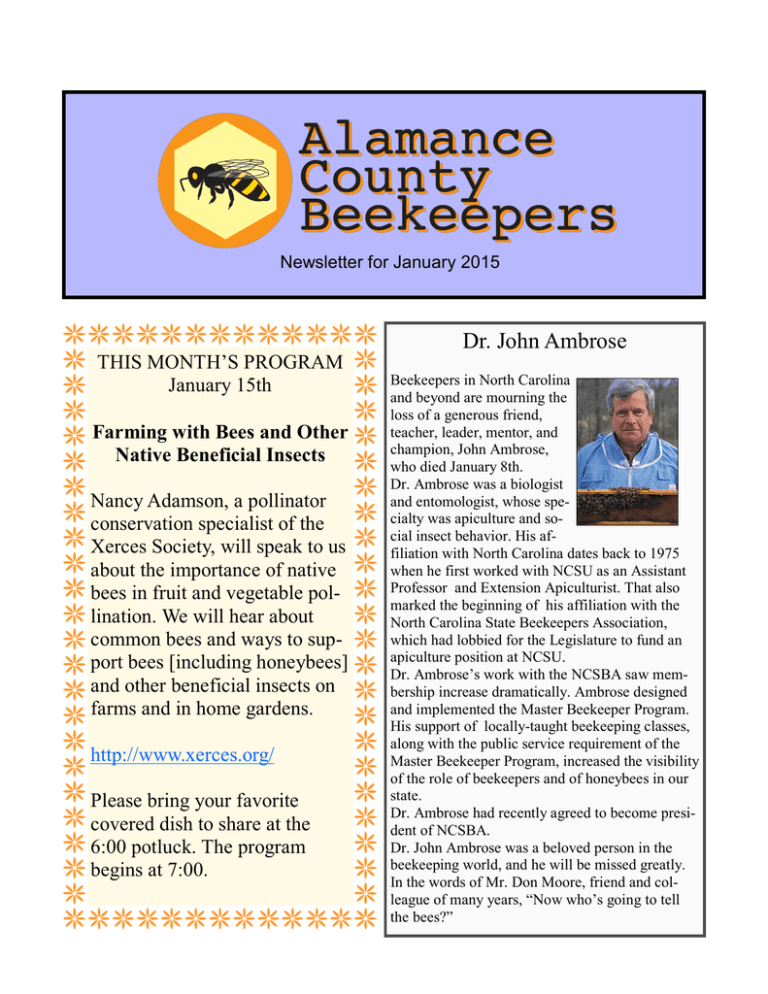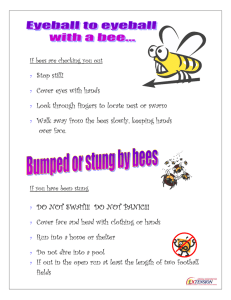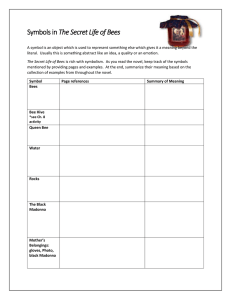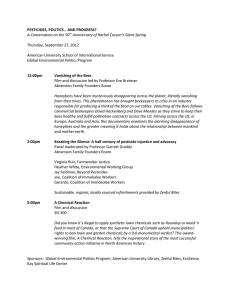Dr. John Ambrose - The Alamance County Beekeepers
advertisement

Newsletter for January 2015 THIS MONTH’S PROGRAM January 15th Farming with Bees and Other Native Beneficial Insects Nancy Adamson, a pollinator conservation specialist of the Xerces Society, will speak to us about the importance of native bees in fruit and vegetable pollination. We will hear about common bees and ways to support bees [including honeybees] and other beneficial insects on farms and in home gardens. http://www.xerces.org/ Please bring your favorite covered dish to share at the 6:00 potluck. The program begins at 7:00. Dr. John Ambrose Beekeepers in North Carolina and beyond are mourning the loss of a generous friend, teacher, leader, mentor, and champion, John Ambrose, who died January 8th. Dr. Ambrose was a biologist and entomologist, whose specialty was apiculture and social insect behavior. His affiliation with North Carolina dates back to 1975 when he first worked with NCSU as an Assistant Professor and Extension Apiculturist. That also marked the beginning of his affiliation with the North Carolina State Beekeepers Association, which had lobbied for the Legislature to fund an apiculture position at NCSU. Dr. Ambrose’s work with the NCSBA saw membership increase dramatically. Ambrose designed and implemented the Master Beekeeper Program. His support of locally-taught beekeeping classes, along with the public service requirement of the Master Beekeeper Program, increased the visibility of the role of beekeepers and of honeybees in our state. Dr. Ambrose had recently agreed to become president of NCSBA. Dr. John Ambrose was a beloved person in the beekeeping world, and he will be missed greatly. In the words of Mr. Don Moore, friend and colleague of many years, “Now who’s going to tell the bees?” From NCSBA Beebuzz — Your Review Requested Members, Updated Constitution and By-Laws documents have been posted to the members area of the website for your review, comment and approval. The suggested, edited and updated Constitution and By-Laws will be voted on by the membership at the business meeting of the Members on February 6, 2015 in Monroe, NC. There are several significant changes that are suggested to update and to provide more efficient operating procedures that are in line with activities as are done today for the NCSBA organization. You can find the documents here: http://www.ncbeekeepers.org/members-only/2015-constitution-and-by-laws/ (password is on the back of your membership card) Please send any feedback directly to Paul Madred at pljmadren@gmail.com Notes from November’s Meeting It’s time to renew membership. Officer slate for 2015 approved. Contact Randy Stinson if you want to participate in 2015’s State Fair display. It’s not too early to commit. Corey Gillespie told of his adventures as a first-year beekeeper, and Don Davis gave us the view from his second year. Thanks for sharing! Next meeting will be January 15, 2015. Hot Toddy for a Cold Day 1 oz (2 tablespoons) bourbon 1 tablespoon mild honey 2 teaspoons fresh lemon juice 1/4 cup boiling-hot water Put bourbon, honey, and lemon juice in a 6ounce mug. Top off with hot water and stir until honey is dissolved. From epicurious.com 2015 Beekeeping Course Starts January 20th For the 24th consecutive year, the Alamance County Beekeepers group is offering a beginning beekeeper training series. This year, almost two dozen people have signed up for the classes. If you were in last year’s course, still have your books, and would like to repeat, the cost is $10. Contact Ira. Many thanks to all presenters who share of their knowledge, experience, and know-how . Welcome, new beekeepers! Honey Bees 101: Resolutions for Your 2015 Beekeeping Year by Jamie Ellis I decided to take a short break from my typical Honey Bees 101 column and, instead, give you some pointers for producing the healthiest, strongest, and most productive colonies for the 2015 season. Call these pointers “resolutions” if you will. I feel these are things that every beekeeper should do in order to protect the bees that they have and make the bees as profitable and productive as possible. 1) Make Varroa control a priority. Many beekeepers and bee scientists believe that Varroa are the number one killer of bees on the planet. They harm bees in three ways. First, they feed on bee hemolymph (blood). Second, they vector pathogens that harm bees. Third, beekeepers use chemicals to control Varroa, and many of these products have been shown to impact bees negatively in some way. As a result, every beekeeper should make it a priority to stay up-to-date on the latest Varroa control measures and do whatever it takes, within the realm of legal options, to control this devastating pest. 2) Experiment with resistant queen stocks. I find that most beekeepers have not given queens bred for resistance to various pests/pathogens a fair chance. Most beekeepers have never used resistant stock in the first place, let alone used the stock appropriately. Purchase a few queens bred for resistance to Varroa, for example, and see how they perform in your particular management paradigm. 3) Practice effective swarm control. Swarm control is not viewed as a favorable practice in some beekeeping circles and that is absolutely ok. However, swarm control is necessary if you want your colonies to be as strong and productive as possible. I consider swarm control an essential part of bee management. Think of it as the best way to keep your bees. 4) Focus on bee nutrition. It is no secret: nutrition is important to bees. I often feel that our bees do not have the available nutrition they need to thrive. We tend toward the belief that as long as something is available in the environment, the bees have everything they need. However, not all pollen and nectar are created equal. Generally speaking, nectar quality is more stable than is pollen quality. I tend to find that colonies lack in nectar quantity (not enough nectar to make into honey) and often need to be fed, while they lack in pollen quality (not a nutritious pollen) and need a better source. Learn when to feed and what to feed. 5) Ensure that your colony is headed by a good quality queen. This is not to be confused with the advice I offer in point 2 above. Instead, I am advising that beekeepers learn to recognize good queens and poor queens, and work to remedy the latter. I see many beekeepers satisfied with simply having any queen in their colony, regardless of the quality and productivity of the queen. Beekeepers should be able to identify failing queens and have the confidence to replace those queens with better quality queens. 6) Conduct an honest assessment of the quality of forage resources in the area where your bees are located. Not all apiary sites are equally good for bees. Bees perform better when they are managed in optimum environments. The best way to determine the quality of a potential apiary site is to locate a few bee colonies there and allow them to tell you how good the site is. 7) Control the pests and pathogens that are manageable. Some pests, such as Varroa and Nosema, cannot be controlled easily and predictably. However, many beekeepers spend so much time and energy addressing these problems and ignore controlling pests and pathogens that can damage colonies significantly but are otherwise easy to control. These include European and American foulbroods, chalkbrood, tracheal mites, wax moths, and, to some extent, small hive beetles. It is important not to overlook the “minor” problems. 8) Spend time researching the latest information related to beekeeping. There is so much information related to beekeeping being generated around the clock. A lot of this information concerns new ways to treat pests/pathogen, the latest news on bee nutrition, etc. This information can be found in the national bee journals, beekeeper newsletters, the latest books, online communities, etc. In my experience, the more informed the beekeeper, the better the beekeeper. The better the beekeeper, the healthier and more productive the bees. 9) Join and actively participate in local, regional, and/or state bee clubs. This is a supplemental point to point 8. The best beekeepers work to stay informed of the latest information related to the craft. The beekeepers’ associations are the best means of networking with other beekeepers. Beekeeper associations allow you to network with other beekeepers, shape policies related to beekeeping at the local, state, and national levels, interact with the “movers and shakers” in the beekeeping industry, etc. I believe membership in beekeeper associations should be a priority for every beekeeper. 10) Do not forget the small things that [may] matter. Have you rotated your combs out of colonies in the past 10 years? Do your bees have an adequate water source nearby their hive? Do you believe your bees are exposed to pesticides outside the hive regularly? Do you live in an area where bears are present? How good is the physical hive in which the bees live (does it need to be painted or parts replaced)? Do you have too many colonies in your apiary(ies), thus leading to limited resource availability? They say the “devil is in the details.” Attention to small details such as these can make the difference between a successful beekeeping season and a catastrophic one. Happy beekeeping in 2015! From American Bee Journal, January 2015, page 34. Reprinted with permission. Ira and the planning group met in December to organize programming for 2015. Stay tuned as more programs are confirmed for a new year of learning! http://alamancebeekeepers.org/ Potluck or Snack? A tradition explained. New members of the group might not know why some meetings include a potluck beforehand, while others simply have a snack time. Turns out, whenever we have a speaker from outside the ACB group, we bring an evening meal to share before the program begins. Officers for 2015 January in the Piedmont. Do your bees have enough to eat? President : Ira Poston Vice President : Mike Ross Recording Secretary : Mary McGinty Treasurer : Randy Stinson Program Chair : Don Moore 1st Year Director : Randy Stinson 2nd Year Director : Larry McCauley, Jr. 3rd Year Director : Wayne Foulks Appointments Newsletter : Cynthia Pierce Webmaster : Geoff Leister



